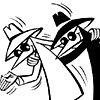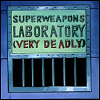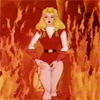
It is bitter cold here; the snow falls gently but steadily. There’s been no sun. The sky is grey. And though it started out mild — Winter has yet to fade from memory. I like Winter and its holidays — though I like to celebrate calmly and quietly, as opposed to getting worked up over the perfect placement of glitter or whether or not there are spots on the silverware, and I look forward to enjoying the days as the light stretches and it’s no longer dark by four p.m. Though, admittedly, I do prefer the stories of old, the idea that there’s a battle between light and dark and, just as one example, the chariot of the sun returns victorious for a time. I am definitely a seasonal creature.
Writing, however, can’t follow a seasonal pattern. It has to be year-round for me, for anyone who runs a business or hones the craft. If you wait for the perfect environment, you’ll be an eternal Virgin, sitting in a chair, wondering when your White Knight (or White Lady Knight) will show up and rescue you from the dream you’ve trapped yourself in.
Waiting, waiting, waiting — the true death knell for any creative. There’s always something to wait for, sure, but it’s a trap that can affect my/your ability to write. You wait for word before taking on anything new. You wait for a client’s payment to come through. You wait to see how the book’ll be received by reviewers, agents, fans. You wait for a big deal to come through because that’ll determine the next “x” months amount in your schedule.
But all that time spent waiting? Occurs simultaneously or in conjunction with other creative efforts. The media bills “comebacks” — that’s a marketing term — but in the mean time: the bills still come, meals still have to be made, and life still happens. It still happens, every day, regardless of what news comes down the pipe.
And so must the written word.
I’ve entered a few bad business arrangements and, after a while, I realized that those red flags forced me to question what I was working on and who I was spending my time with. That caused a different kind of waiting, the type that occurs when you enter into your own form of decision paralysis. I’ve worked with AMAZING people, mind you, and have been invisible on a number of projects, but I’ve also had some experiences, in particular where my work was supposed to be the focus, that fell through. It happens, you get over it, and you move on. But the bills still come, I still need to eat, and I still have to have a life, regardless of the ups and downs I encounter in my career.
Where I spend my creative time is as important as who I work with. However, the where’s and how’s and when’s are all fine well and good — but the words still have to flow in spite of everything else that’s going on. And, what I’m realizing, is that emotions can affect creativity moreso than stalled news. When I feel anxious or stressed, I need to either channel that emotion into my work, or write through that either in journal entries or blog posts that get deleted, so I have a blank slate. Tabula rasa. When I’m experiencing bad emotions, I need to write MORE, not less. And that’s how I move forward.
Even outside of personal news or baggage, there’s a lot to get pissy about. Gun control. Gerrymandering. Gay rights. Cohabitation rights. Women’s rights. War. Climate change. Artist’s rights and payment. Nerd rage (or lack thereof). Misogyny. Etc. Etc. Etc. But, like getting addicted to television or games, spending hours upon hours consuming media instead of creating it, these are “junk food” emotions that you don’t really feel, because it’s not really happening to you, but the media is geared to make you feel that way so you respond by commenting or clicking through or paying attention. You feel like you’re personally affected, like your buttons are all being pushed at the same time, because the reporters have a job to do, and that’s to GRAB YOUR ATTENTION ZOMG RIGHT NOW YOU HAVE TO PAY ATTENTION TO MEEEEEEEEEEE!
They’re trying to get readers, much like you or I might, and they have. It’s infuriating, but these sensationalist tactics work right now. (I hold to my prediction they won’t always work and this, too, shall pass eventually.) Contemporary journalists have created a need. Even though you don’t “need” to know, you really do. They have done a tremendous job, and it affects anyone who’s online even a fraction of the time.
I feel there’s a lesson to be learned here. That this “need to know” can translate to a “need to write.” I don’t care how many words I write in a day anymore as long as I’m writing them. I have to balance the projects I’m working on and have made smarter decisions about which projects I choose — but I need to write. I have to write.
It begins with free-writing out my emotional kerfluffles, all of it, shamelessly and guilt-free, on a fresh piece of paper. (A tip I picked up from The Artist’s Way.) I do this to discharge everything that’s in my head and heart, so I can valiantly approach my stories and game narratives with a clear perspective. I replace meditation (waiting) with writing (doing) and then I’ve written something before the real work begins. I do this, because all this shit builds up, all my reactions to the “need to know” that surrounds me, because this is how I respond to the sensationalists — I can’t “do” anything about what’s happening other than voting in my own state or participating in a community event in my own backyard. If I’m not “doing” — I’m “waiting.”
And that is the death to any creative.
Then, after I “do” for myself, I get to work — more doing. After work and meetings, I make the most out of my free time. I cook, I read, often for research or work, I design and create jewelry on my own or with my friends, I game, I work out, travel, and enjoy the full breadth of what the seasons have to offer me here. Obviously, more activities are planned around conventions and the warmer weather, but the point of this, is that I’m still doing.
So, to sum up?
STOP WAITING. START DOING.
- Mood: The sun will come out… SOMEDAY.
Caffeinated Beverages Consumed: Had to kick brain cell-killing diet soda, so feeling sluggish.
Work-Out Minutes Logged Yesterday: Up and down and all around.
In My Ears: “You Don’t Dream In Cryo,” Avatar soundtrack. (Hey, don’t judge. The soundtrack is good.)
Game Last Played: Sonic and All-Stars Racing Transformed
Movie Last Viewed: Lorax
Latest Artistic Project: Holiday gifts. Man, I should mail those out…
Latest Release: “The Button” We Are Dust anthology




